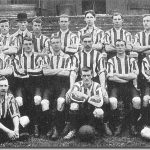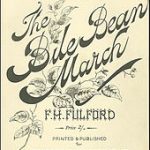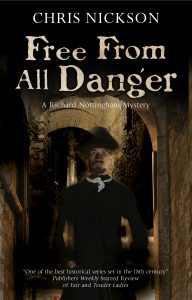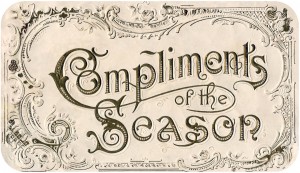It’s December, and that means it’s time for the annual miscellany of strange Leeds history you can use to amaze friends and relatives over those turkey dinners (vegetarian and vegan options available).
 Of course, everyone knows Leeds United (and We All Love Leeds, right?). But perhaps not everyone knows that the club rose from the ashes of another football club, Leeds City AFC. It was formed in 1904 and played in Hunslet, never getting higher than the Second Division. After World War I, it was accused of making illegal payments to players (which was a common practice). But the club refused to allow the Football League to examine its books, and it was kicked out in 1919. Within a few days, however, Leeds United was formed. But there have been other Leeds City clubs since then, first in 1924, then again in 2006.
Of course, everyone knows Leeds United (and We All Love Leeds, right?). But perhaps not everyone knows that the club rose from the ashes of another football club, Leeds City AFC. It was formed in 1904 and played in Hunslet, never getting higher than the Second Division. After World War I, it was accused of making illegal payments to players (which was a common practice). But the club refused to allow the Football League to examine its books, and it was kicked out in 1919. Within a few days, however, Leeds United was formed. But there have been other Leeds City clubs since then, first in 1924, then again in 2006.
 You might well have seen the ghost signs on gable ends of older houses for Bile Beans and wondered what they were. Essentially, a laxative; hardly glamorous, but remarkably successful. The company began production in Canada in 1899, but in the same year they opened a factory in Leeds and the product became one of the city’s great exports, even though it had its share of controversies. They weren’t invented by an eminent scientist, as the advertising claimed, but by Charles Fulford, the company owner. Several generations consumed them religiously to stay regular. There was even a Bile Bean March composed.
You might well have seen the ghost signs on gable ends of older houses for Bile Beans and wondered what they were. Essentially, a laxative; hardly glamorous, but remarkably successful. The company began production in Canada in 1899, but in the same year they opened a factory in Leeds and the product became one of the city’s great exports, even though it had its share of controversies. They weren’t invented by an eminent scientist, as the advertising claimed, but by Charles Fulford, the company owner. Several generations consumed them religiously to stay regular. There was even a Bile Bean March composed.
 Leeds had another good export in Bantam Coffee, an early form of instant coffee (ironic, perhaps, given the coffee snobbery in the city today). It was made in Wortley, and a 1922 British Industries Fair ad read: “The World’s finest coffee in its most handy form. It is made in a minute – and is then as perfect as good coffee can be. Requires no coffee pot or elaborate preparation, and straining is unnecessary. Bantam Coffee is ideal for expeditionary enterprises, one pound being equivalent to ten pounds of ordinary roasted coffee. It is the most portable of all brands of coffee, natural or essence.”
Leeds had another good export in Bantam Coffee, an early form of instant coffee (ironic, perhaps, given the coffee snobbery in the city today). It was made in Wortley, and a 1922 British Industries Fair ad read: “The World’s finest coffee in its most handy form. It is made in a minute – and is then as perfect as good coffee can be. Requires no coffee pot or elaborate preparation, and straining is unnecessary. Bantam Coffee is ideal for expeditionary enterprises, one pound being equivalent to ten pounds of ordinary roasted coffee. It is the most portable of all brands of coffee, natural or essence.”
For quite a few centuries, Leeds has enjoyed the Saturday night tradition of a few pints and a scrap, but going back in time, it’s known to have had a duel or two. The first on record was in 1209, between Adam de Beeston and William Gammary who was Lord of Middleton. It took place to determine the ownership of some land.
There are no racecourses in Leeds these days, of course, but one did exist in Chapel Allerton, on what was Chapeltown Moor (where they also held the hangings). Several races are known to have taken place there, including one instance of a man racing against a horse and winning. For a few years in the 19th century, horse racing took place in Haigh Park, drawing huge crowds, reputed to be over 100,000 people, and races were also held on Holbeck Moor and Woodhouse Moor.
Being in Leeds means knowing about back-to-back houses; after all, this is the city that kept building them long after everywhere else had stopped. But what about the salt pie house? Ever heard of that? It’s just one half of a back-to-back, built where there wasn’t the room for two houses to back against each other. The rear wall is blank.
The Leeds Rifle Club existed for two years, beginning in 1836, and used to shoot at Kirkstall Abbey. However, it shut up shop when members discovered they were actually running an illegal group. Oops.
And finally, you have to love the idea of Leeds Whisky Money. Not a fund to help people buy it, but a tax from 1890 – sixpence on liquor – to help fund technical education. It was brought in by the then Chancellor, Mr. Goschen. But it did the trick: in 1904, educational groups in Leeds received £7,000, a very healthy sum in those days.
With gratitude to David Thornton’s invaluable Leeds: A Historical Dictionary of People, Places and Events. Every Leeds home should have a copy.
 Chris Nickson is the author of several historical crime novels set in Leeds. Free From All Danger is the long awaited eighth novel in the Richard Nottingham series.
Chris Nickson is the author of several historical crime novels set in Leeds. Free From All Danger is the long awaited eighth novel in the Richard Nottingham series.
Leeds, 1736. Lured out of retirement to serve as Constable once again, Richard Nottingham discovers that he’s dealing with a new kind of criminal: someone who believes he’s beyond the law; someone willing to brutally destroy anyone who opposes him. To stop him, Nottingham must seek help from some very unlikely sources.
Free From All Danger was published on 31 October by Severn House. You can order your copy here.

